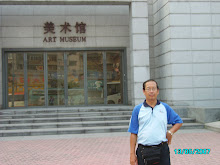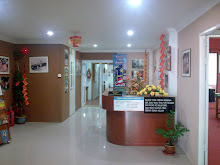 Skilled workforce: Workers in early stages of constructing a ship.
Skilled workforce: Workers in early stages of constructing a ship. Heavy work: A worker unloading gas for use in the cutting of metal
Heavy work: A worker unloading gas for use in the cutting of metal Safe environ: A worker cutting metal on top of a nearly-completed ship
Safe environ: A worker cutting metal on top of a nearly-completed ship THE robust shipbuilding industry in central Sarawak, which generates hundreds of million of ringgit in sales a year, is set for expansion now that the majority of the unlicensed shipbuilders have relocated to the Rantau Panjang Industrial Estate in Sibu.
THE robust shipbuilding industry in central Sarawak, which generates hundreds of million of ringgit in sales a year, is set for expansion now that the majority of the unlicensed shipbuilders have relocated to the Rantau Panjang Industrial Estate in Sibu.State Assistant Minister for Industrial Development Larry Sng Wei Shien said all 32 industrial lots on 66ha in the estate had been taken up. All the lots have river frontage to facilitate the movement of new vessels.
“More than a dozen shipbuilders are in operation or constructing factories there,” he said in an interview.
He said the estate was designated for shipyards producing vessels of less than 10,000 tonnes (small to medium) and were mostly tugboats and passenger express boats.
Sng, also Assistant Minister in the Chief Minister’s Department (Economic Planning), said that authorities had issued eviction notices to 21 shipbuilders in Sungai Bidut and Engkilo (on the other side of the Rejang and Igan rivers opposite Sibu town) and asked them to resettle in Rantau Panjang or the Tanjung Manis new township.
This was because their shipyards were sited on agricultural or industrial land not meant for shipbuilding.
The Tanjung Manis shipbuilding zone caters to shipyards producing sea-going vessels exceeding 10,000 tonnes. Twenty-four lots covering 200ha there had been earmarked for the shipbuilding and shiprepair industries.
Sng, also Assistant Minister in the Chief Minister’s Department (Economic Planning), said the state’s third shipbuilding and repair zone was in the Kuala Baram Industrial Estate in northern Sarawak. Eight shipbuilding firms were already in operation there.
He said the establishment of the shipbuilding and repair zones was in line with government efforts to nurture orderly development and long-term sustainability of shipbuilding and its supporting industries.
He said the industry in Sibu mostly produced vessels for export.
The biggest shipbuilder in Rantau Panjang can build 30 tugboats simultaneously.
To the handful of unlicensed shipyards in Sungai Bidut and Engkilo, which are yet to relocate, Sng said: “You either move or close down. The state will act accordingly.”
He said the state had held discussions with them on the relocation from as early as 2002.
“They have been given ample time and a long grace period to relocate. They cannot blame anyone except themselves when the state takes action,” he added.
Sng said the state could no longer allow the shipyards to pollute the river with their wastes.



.jpg)

No comments:
Post a Comment